‘Time has slipped by so quickly,
that his heart has not had a chance to grow old’ -Dino Buzzati, The Tartar Steppe
In his 1908 philosophical work “The Unreality of Time”, idealist philosopher J. M. Ellis McTaggart believed time – and its components of past, present, and future – to be a social construct deriving from the erroneous belief that the individual perception we, at any given moment, have of unfolding events (called “specious present”) is one and common to all people. In McTaggart’s words:
Why do we believe that events are to be distinguished as past, present and future ? I conceive that the belief arises from distinctions in our own experience. At any moment I have certain perceptions, I have also the memory of certain other perceptions, and the anticipation of others again. The direct perception itself is a mental state qualitatively different from the memory or the anticipation of perceptions. On this is based the belief that the perception itself has a certain characteristic when I have it, which is replaced by other characteristics when I have the memory or the anticipation of it which characteristics are called presentness, pastness, and futurity. Having got the idea of these characteristics we apply them to other events. Everything simultaneous with the direct perception which I have now is called present, (…) in the same way acts simultaneous with remembered perceptions or anticipated perceptions are held to be past or future,(…) but the origin of our belief in the whole distinction lies in the distinction between perceptions and anticipations or memories of perceptions. (…) The direct perceptions which I now have are those which now fall within my “specious present”. Of those which are beyond it, I can only have memory or anticipation. Now the “specious present” varies in length according to circumstances, and may be different for two people at the same period. The event M may be simultaneous both with X’s perception Q and Y’s perception R. At a certain moment Q may have ceased to be part of X’s specious present. M, therefore, will at that moment be past. But at the same moment R may still be part of Y’s specious present. And, therefore, M will be present, at the same moment at which it is past. This is impossible. (…) We are considering attempts to take time as real, as something which belongs to the reality itself, and not only to our beliefs about it, (…) then at any moment M must be present or past. It cannot be both. The present through which events really pass, therefore, cannot be determined as simultaneous with the specious present. It must have a duration fixed as an ultimate fact. This duration cannot be the same as the duration of all specious presents, since all specious presents have not the same duration. And thus an event may be past when I am experiencing it as present, or present when I am experiencing it as past. (…) What reason can we have to believe in the existence of such a present, which we certainly do not observe to be a present, and which has no relation to what we do observe to be a present?
Within this understanding of time (or rather, this disbelief), every human being is left alone to his/her individual experience of past-present-future, which is then objectified as – we might argue – a psychological defence mechanism to affirm the Self: “if I’m the only one experiencing this reality, is this reality real at all?” and “if this reality isn’t real, am I real?”.
But what happens when a human being is unable (or unwilling) to believe his/her perception of time to be the ultimate proof of time’s existence? That is: what if a person refuses to accept his/her perception of events as objective? This would somehow tear reality’s “veil of Maya” apart and push the individual into an atemporal, surreal state of being; what then if such denial of reality is shared by two persons, who simultaneously refuse to accept what they perceive as being the ultimate truth? By refusing their own subjective reality, both individuals reach (willingly or not) a truth – the absence of a common objective experience – which indeed allows them to have one (and perhaps the only possible) common objective experience (the shared understanding of the lack of objectivity). This common experience creates a level of spiritual intimacy between two individuals which would otherwise not be achieved. I will call this shared experience and the closeness deriving from it “atemporal affinity.”
The recent restoration of Wong Kar-wai’s “In the Mood for Love” shed some new light on this 2000 masterpiece, which I believe can be used as the perfect example of atemporal affinity. The movie, set in 1960’s Hong Kong, begins with two couples casually renting adjacent rooms in a crowded apartment. Given the busy working schedules that cause their respective partners to stay long time away from home, soon the two remaining spouses – Mrs. Chan and Mr. Chow – develop a gradual friendship, which draws them closer when they discover that their partners are actually in a relationship with one another (that is, Mrs. Chan’s husband with Mr. Chow’s wife). In order to cope with the trauma, Mrs. Chan and Mr. Chow together try recreating their partners’ affair, so as to better understand the dynamics that led to it. By each impersonating the other’s spouse, they imagine major events that must have happened throughout the extra marital relationship, re-enacting every episode several times in order to better make it coincide with each other’s platonic idea of their beloved one (a psychological defence mechanism to limit the pain of betrayal by finding ways to partly justify the infidel partner). As time goes by, Mrs. Chan and Mr. Chow’s rejection of reality grows stronger, gradually alienating them from their surroundings and even their spouses (which were the reason everything started in the first place), while simultaneously drawing them closer to one another like actors in a play that they can’t (or don’t want to) stop. In the increasing denial of their subjective perception of events, the two individuals construct their own private world purposely detached from reality – therefore (the presumption of) time. Every shot in the movie beautifully shows us the atemporal universe in which Mrs. Chan and Mr. Chow now live together: the old corridor connecting the apartment to the noodle shop down the road, the apartment’s staircase, the old landlady’s kitchen…the same locations repeated over and over with identical shots, each accompanied by the same sensual, ethereal, song pieces that constitute the endless leitmotif of their microcosm void of time (one being a string composition that repeats itself in a circle, the other a spanish-language song that clashes against the asian reality in which it is played, thereby further feeding surrealism). The movie’s visuals further express the surreal character of Mrs. Chan and Mr. Chow’s experience: the lights and shadows, the colors, all acquire a particular intensity in the scenes in which the two are together, transforming every shot of them into an untouchable painting, thus stressing Mrs. Chan and Mr. Chow’s detachment from “the rest”. In the stillness of this world, their atemporal affinity, allows them to develop a strong complicity which eventually translates into Love. The real change throughout the movie is thus the one in their relationship, which gradually develops against a background of painful apathy: in order to buy herself dinner, Mrs. Chan walks the narrow alley leading from her apartment to the noodle shop, here she often meets Mr. Chow coming from the opposite direction…as the movie proceeds, the glance that they give to one another as they casually meet in the alley grows longer; Mrs. Chan and Mr. Chow repeatedly take the same taxi on their way home, but as time goes by, Mrs. Chan’s head gradually lies on Mr. Chow’s shoulder; almost every day the two return back to their apartment together…yet…change is manifested by them gradually walking closer to one another, with one’s hands slowly searching for the other’s.
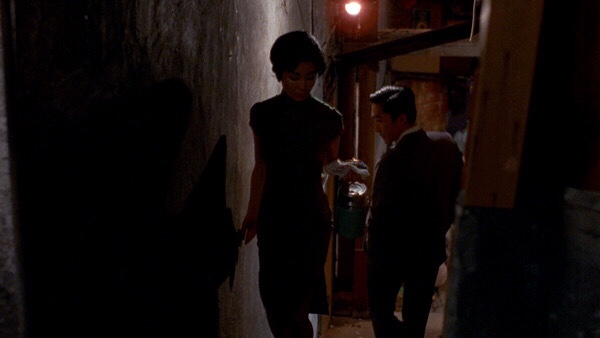
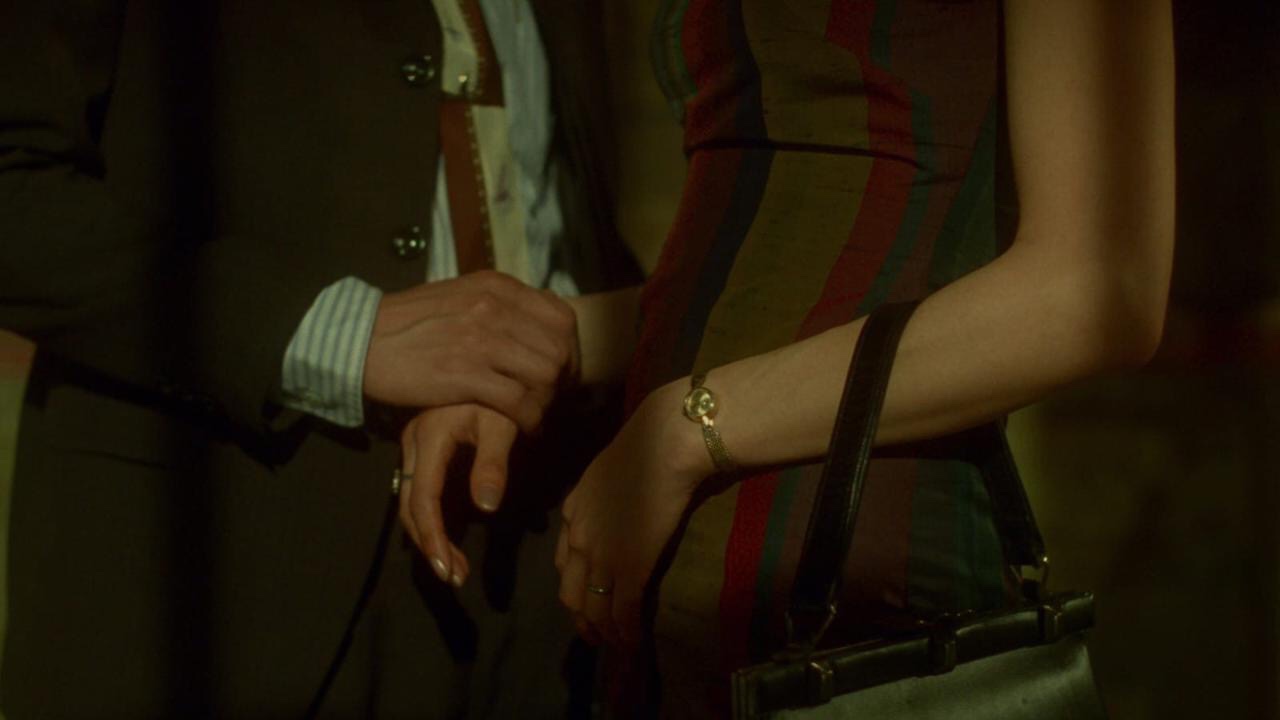
By refusing to accept their own subjective reality, two individuals construct for themselves an apparently fictional world which unwillingly proves to be more authentic than the one in which they previously had been living, and with it its emotions. However, the two lovers are abruptly brought back to “reality” (or, what is commonly believed to be it) by the increasing neighbors’ attention that their relationship is drawing. The outer world is overwhelmingly reclaiming its primacy over Mr. Chow and Mrs. Chan’s lifes; their happiness is now a treasure to be safeguarded from past interferences. Wong Kar-wai skillfully gives us this sense of secrecy trough shots that make us feel as if we’re intruding into Mrs. Chan and Mr. Chow’s own private world: a mirror on the wall reflecting the two lovers talking in a solitary room, a tiny window able to catch a glimpse of the two, a far away door from which to spot them whispering in the distance. The neighbours’ inclination towards gossip (a subconscious norm-setting and norm-regulating behavior) and the typical Hong-Kong crowdedness of their apartment thus create a tyrannical social pressure that prevents Mrs. Chan and Mr. Chow from expressing their true feelings to one another. Their love then becomes a sequence of silences, skillfully protecting a strong sentiment which manifests itself through symbolic gestures: a hand, a gaze, a smile. The most significant scenes throughout the movie (as we will see later on) are those in which silence is present the most, as opposed to words, which are mostly (but not always) a facade to be exposed to the outer world: the small talks with their neighbors, the empty talks with their spouses. This symbolism — and the hermeticism deriving from it — is typical of the far Eastern cultures to which Wong Kar-wai and the two lovers belong; from the Japanese haiku to Confucianism: a gesture or simple sentence to explain what a thousand words cannot.
Despite their taking refuge in silence, Mr. Chow and Mrs. Chan try fighting against the oppressing forces from the outer world: Mr. Chow rents a hotel room on the other side of the city able to serve as a materialization of their shared private world, a microcosm that allows the two lovers to develop their relationship to the fullest: with the help of Mrs. Chan, Mr. Chow finally fulfills his dream of writing martial arts serials.
Long days are spent together inside the same, small hotel room…yet – as in every other space throughout the movie – Mrs. Chan and Mr. Chow are the sole changing elements, in opposition to a still, motionless scenery; hence, after numerous nights spent in the same hotel room, the two are finally able to acknowledge the feelings that they’ve developed for one another.

The recognition of their mutual love gradually pushes Mrs. Chan and Mr. Chow away from their fictional world – in which each portrays the other’s spouse – back into the common reality, where the two are now lovers: their “acting role” as cheating partners gradually becomes their real role of cheating partners; their spouses’ affair turns into their affair.

Wong Kar-wai shows us the confusion deriving from these overlapping realities with a series of scenes in which the boundaries between who is who become thin and interchangeable: Mrs. Chan is finally confronting her husband on his betrayal, deceiving the viewer into thinking that she finally gathered the courage needed to leave him…yet…we are left surprised as we discover that the husband is in fact Mr. Chow, and that the whole discussion is just a “rehearsal” for Mrs. Chan to imagine how her husband would react in such circumstances.
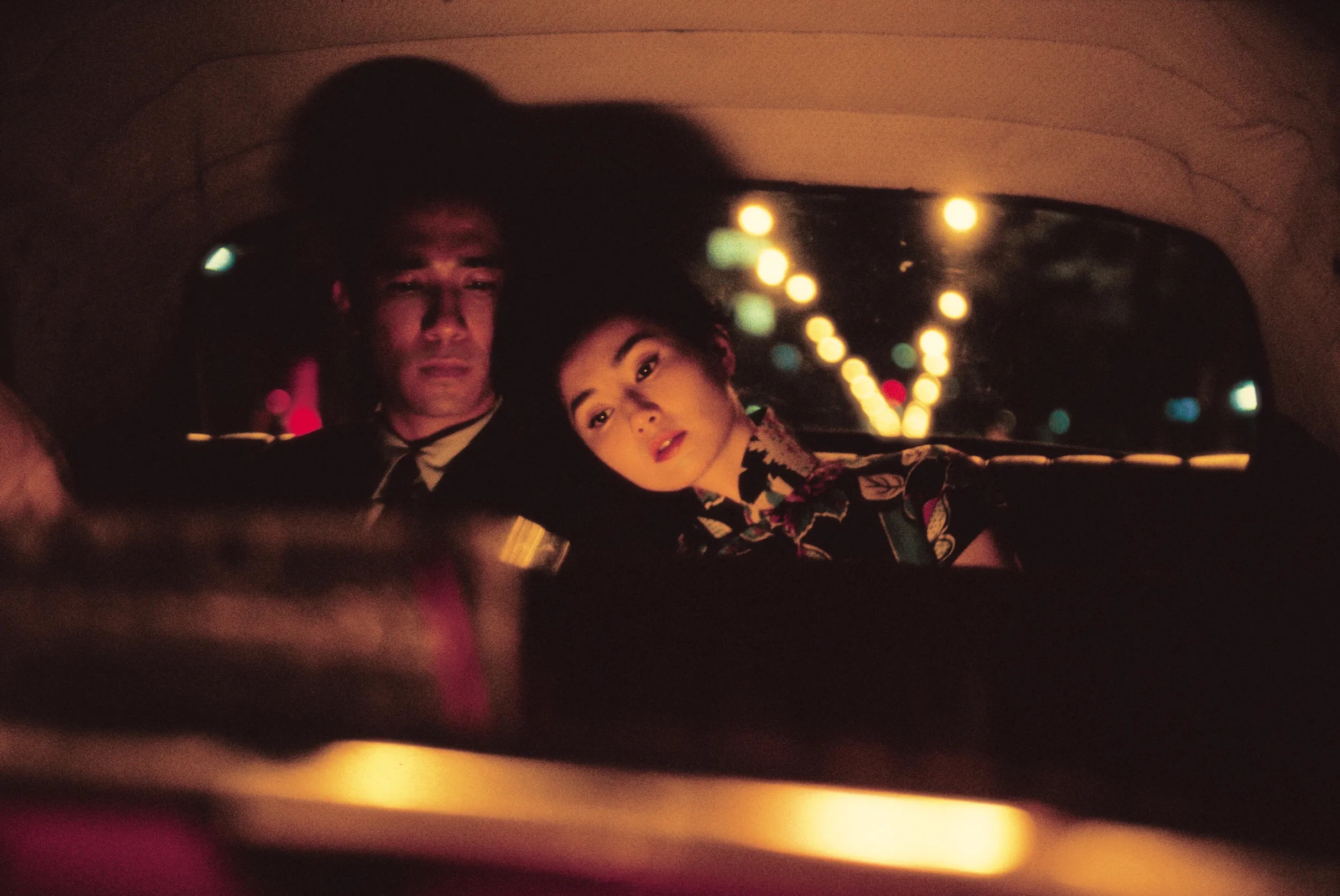
This moving away from the atemporal, surreal world in which their whole relationship developed leaves them helpless against the constraints that are part of the old world to which the two are now returning: their spouses (and with them their betrayal), the apartment’s gossip, the common perceived reality to which everyone else – and in part they – belongs, all constitute an oppressing force that the two have long been ignoring; this outer pressure now returns with twice its strength, eroding the foundations of the world that Mrs. Chan and Mr. Chow have built for themselves, causing mutual misunderstandings which ultimately lead to the end of their relationship: disillusioned with the possibility of Mrs. Chan leaving her husband, Mr. Chow decides to move to Singapore; before leaving, he asks her to run away with him. After an initial hesitation, she decides to do so, but arrives too late at their meeting point.
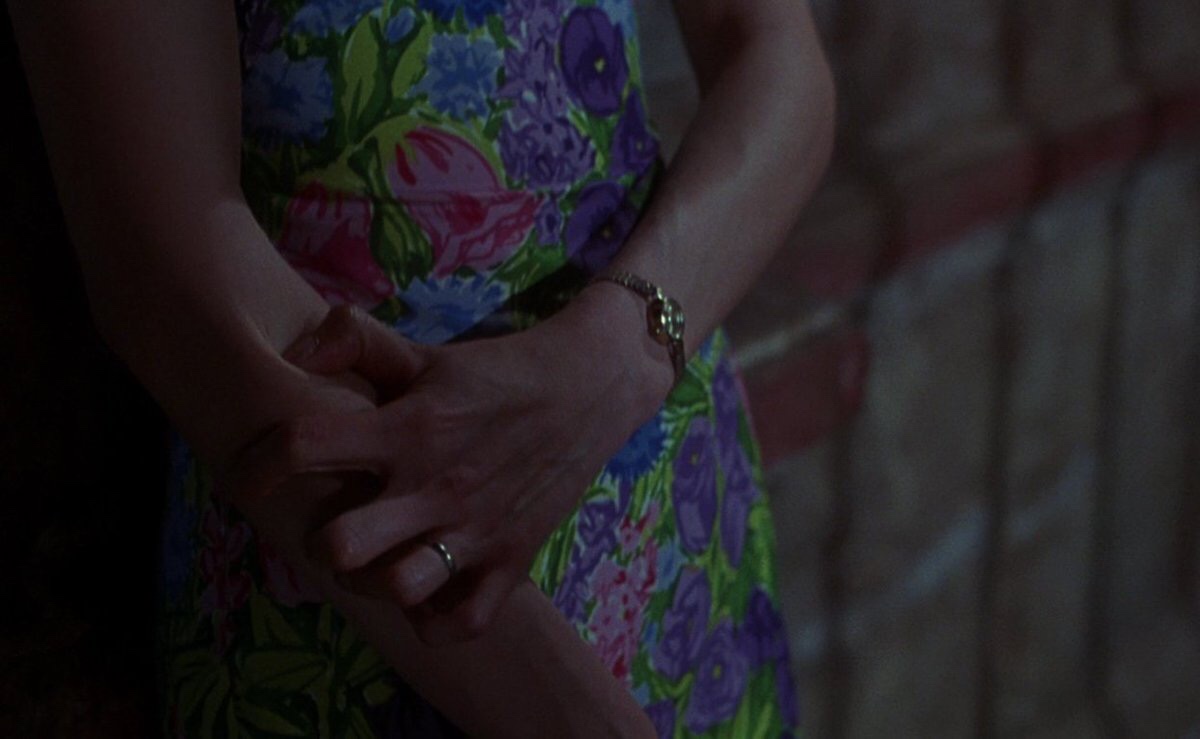
Was there any real chance of them ever being together, or were they “born to die”? The empathy that drew Mrs. Chan and Mr. Chow close to one another developed out of a common aversion towards their respective realities, this is the reason why the love resulting from it could not be translated into their “real life”; the very existence of their romance clashed against the old world to which they belonged, to the point in which the struggle between the two realities (the “temporal” one, and the atemporal one) slowly consumed the two lovers by pain. Eventually, the “temporal” social pressure that makes humans unable to live in isolated atemporal realities, if not for short periods of time, (“He who lives alone is either a beast or a God” – quoting Aristotle) forces Mrs. Chan and Mr. Chow to put an end to the short, yet happy, world that they have experienced. Mrs. Chan arrives late at the meeting with Mr. Chow, thereby losing the opportunity of going with him to Singapore; but this is not an accident, rather the subconscious awareness of the impossibility of their love. The two are not unable to meet, they’re rather unwilling to: a year after Mr. Chow’s departure, Mrs. Chan travels to Singapore and visits his apartment.
From the apartment she calls the office in which Mr. Chow works, but when he answers the phone she remains silent, and eventually hangs up. Three years later Mrs. Chan returns to the apartment in which she and Mr. Chow had lived (together with their spouses) in order to visit her previous landlady; since the landlady is emigrating to the US, Mrs. Chan decides to move into her room. Some time later, Mr. Chow too comes to visit his former landlord, whom he discovers to have moved to the Philippines. After asking who’s now living in the room of Mrs. Chan’s previous landlady, he’s told a woman and her child. Mr. Chow leaves the apartment without knowing (or perhaps not wanting to) that the new tenant is in fact Mrs. Chan.
Despite this subconscious mutual avoidance, the two lovers nonetheless keep reminding one another (and themselves) of their story : when Mrs. Chan visits Mr. Chow’s apartment in Singapore, she smokes a cigarette in his room, and leaves the lipstick-stained cigarette butt in the ashtray.
What is the meaning of Mrs. Chan and Mr. Chow’s romance then?

The answer lies in the movie finale: during his stay in Singapore, Mr. Chow tells a friend the story of how in older times, a person having a secret that could not be shared would go on top of a mountain, make a hole in a tree, whisper its secret into it and cover the hole with mud, for the secret to be safeguarded by the tree. Few years after the two quasi-encounters between Mrs. Chan and him, Mr. Chow travels to Cambodia, and visits Angkor Wat. There, among the ruins of the temples, he finds a hole in a wall. Mr. Chow takes some webs out of it with his fingers, looks at it for a few seconds, and bends towards it. Simultaneously with Mr. Chow’s bending towards the hole in the wall, music enters into the scene; not the usual playful endless piece that appeared throughout the movie, but a passionate crescendo of cellos that has never been heard before…like his secret. The privacy of the moment is brilliantly given us by Wong Kar-wai’s shots: Mr. Chow’s face appears right in front of us, yet we can only see half of it – not the eyes, but less significant details: ear and jawline – for the other half is covered by the wall into which he is whispering, and we are spying on him from the edge of that very wall. He covers his mouth with his hand, as people do when telling secrets into each other’s ears; we know he is talking, but we cannot find out what he’s saying. As he tells his secret to the hole, we can see Mr. Chow from different locations: from the top of a building behind him, from the columns on his left…yet, we cannot see his full face, we are unable to further intrude into the moment.
The scene lasts less than a minute, though time stretches disproportionately in order to accommodate all of the emotions, sensations, and life that Mr. Chow and Mrs. Chan left unsaid to one another…because of external circumstances, because of human mistakes. One last confession, to break the long-lasting excruciatingsilence. Time seem sendless,if not for the growing space filled by the cellos. Finally, we see Mr. Chow as he walks away down the long corridor. Shots of pieces of temples confirm the sacredness of what we just witnessed, assuring us of the confidentiality of the location. One last shot at the hole in the wall, it is now covered with mud and grass leaves.
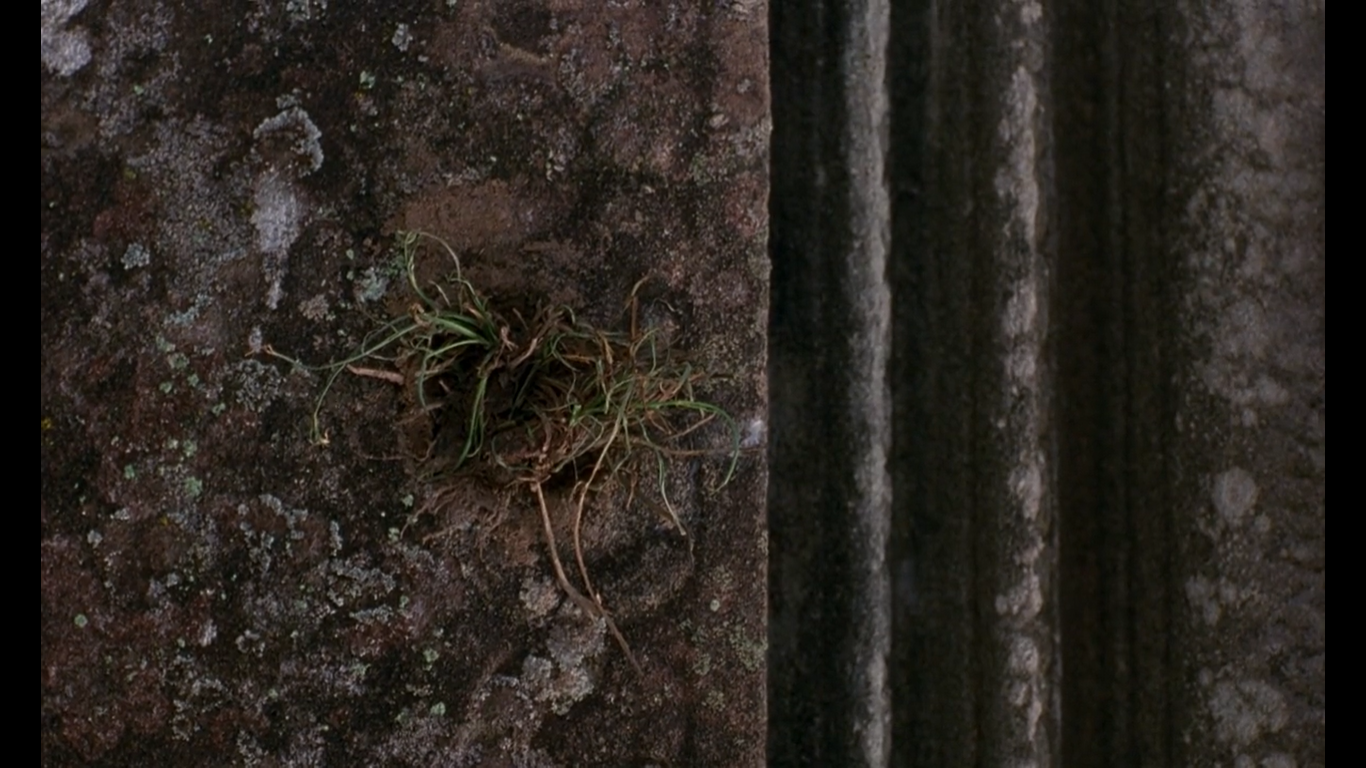
So, what is the point of a doomed relationship? Mr. Chow defeats perceived reality by entrusting a thousand years old temple with the task of protecting the world he and Mrs. Chan had lived in. By refusing to reject his love, he’s able to overcome temporality, thereby defeating the weight of the outer world that man is burdened with, and allowing him to achieve a higher level of awareness. This I believe to be the beauty of Mrs. Chan and Mr. Chow’s romance: despite their inability to transpose their love from a surreal microcosm to the old world to which they inevitably had to return, the two lovers’ refusal to deny it nonetheless frees them from temporal chains, allowing them to soar high above others. Love then becomes the means with which – once again returning to Aristotle’s beast-God dichotomy – we can get rid of our mortal spoils, and turn into beasts…or Gods.
A cura di Davide Gobbicchi.

